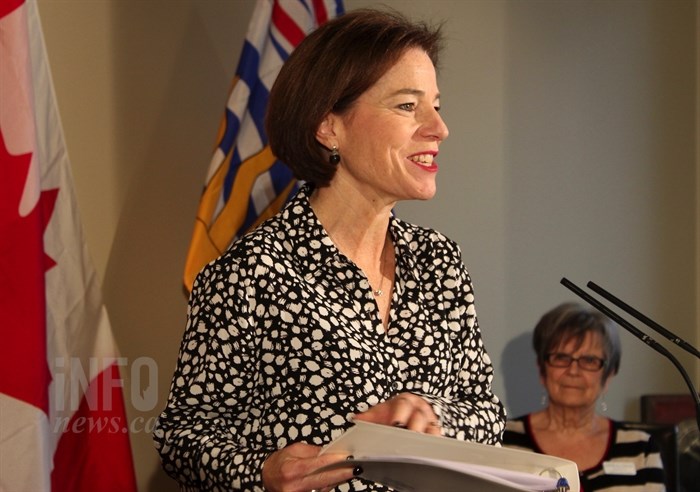
Minster of Municipal Affairs and Housing Salina Robinson spoke at the opening of the final phase of Apple Valley affordable housing project, Thursday, Nov. 15, 2018, as resident Geraldine Barsotti looks on.
(ROB MUNRO / iNFOnews.ca)
November 15, 2018 - 1:03 PM
KELOWNA - Opponents to the Agassiz Road supportive housing development in Kelowna likely don’t have to fear for their safety if that project gets built, but the Minster of Municipal Affairs and Housing Salina Robinson won’t actually make that promise.
“I appreciate their concern, but the previous provincial government didn’t put the kinds of supports in place,” she told reporters after attending the grand opening of the third and final phase of the Apple Valley affordable housing complex.
Critics of the Agassiz proposal fear for the safety of senior women who make up a large number of existing residents.
“We had similar concerns expressed in the Marpole area (of Vancouver),” Robinson said. “The project went ahead. People moved in and we followed it closely and the crime rate went down. People who were housed are getting their health back.”
She noted that the provincial government is currently launching 72 housing projects for low income and homeless people that will create about 4,900 units in B.C. of which 700 units are in the Interior.
Announcements are pending on some projects with Indigenous people but for the most part the latest round of housing announcements is complete.
“We put out an RFP (Request for Proposals) last spring,” Robinson said. “As a result of that we’ve funded projects that were ready to go.”
Municipalities have been directed to prepare housing needs assessments that will help set priorities for the next Request for Proposals in the $7 billion, 10-year provincial housing strategy. The next Request for Proposals likely won’t happen for another year or more, Robinson said.
She also pointed out that the province has empowered municipalities to create rental only zones but only three municipalities in the Lower Mainland have shown interest to date.
The Apple Valley project was developed in conjunction with the Society of Hope to provide affordable housing to almost 200 seniors. The latest 48-unit phase includes a bowling alley. That was a requirement of Gordon and Helen Ziglar. They owned Apple Valley RV Park (where the Landmark buildings now stand) and donated the land to the Society of Hope, but required a bowling alley as part of any housing development.
Apple Valley cost $38 million to build, with $6.2 million from the provincial government and $7.2 million from the federal government.
To contact a reporter for this story, email Rob Munro or call 250-808-0143 or email the editor. You can also submit photos, videos or news tips to the newsroom and be entered to win a monthly prize draw.
We welcome your comments and opinions on our stories but play nice. We won't censor or delete comments unless they contain off-topic statements or links, unnecessary vulgarity, false facts, spam or obviously fake profiles. If you have any concerns about what you see in comments, email the editor in the link above.
News from © iNFOnews, 2018